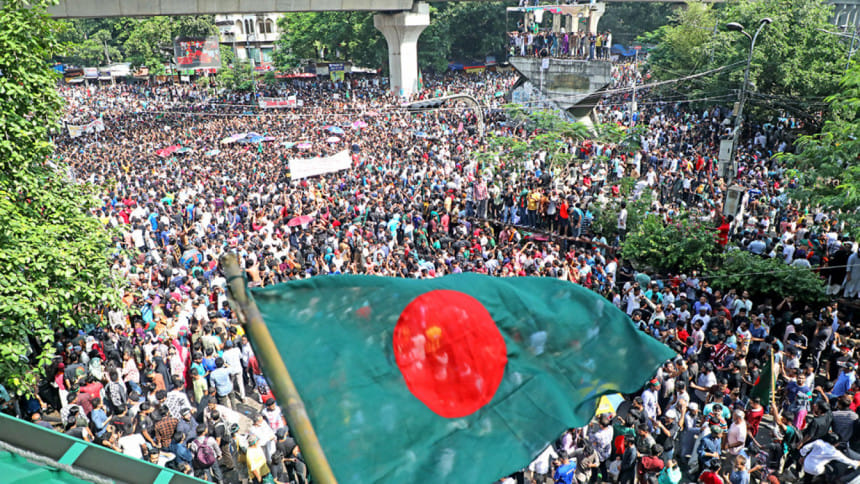Reforms should reflect people’s aspiration
The reforms that are being discussed must align with the aspirations of the people to uphold the unity achieved through the July mass uprising, speakers said at an event yesterday.
They made the remarks at a discussion titled “National Unity: Why, On What Basis, and Which Path?” organised by a platform named “Unity for Bangladesh” at Dhaka University.
The greatest political challenge at this moment is to transform the discussion of unity into a fruitful and actionable process rather than limiting it to political rhetoric or formalities.
In his keynote speech, political analyst Tuhin Khan said, “In election-centric politics, polarisations are inevitable. However, if the government or the political leadership fails to take effective steps on the discussed issues unitedly, it will undoubtedly undermine the aspirations and achievements of the July uprising.”
“The greatest political challenge at this moment is to transform the discussion of unity into a fruitful and actionable process rather than limiting it to political rhetoric or formalities,” he said.
He said if this challenge is not addressed, Bangladesh might face another major political crisis.
“With this in mind, everyone should think sincerely about the process of unity,” he added.
He said political parties are expressing their concerns about the reform initiatives of the interim government. “They are worried whether these reform efforts will create a new political reality and whether that reality will be favourable for them.”
New Age Editor Nurul Kabir said he regarded post-uprising fragmentation in the unity of political parties as a natural phenomenon.
“I don’t see any reason to be worried. Every political party or group operates based on its goals and principles… Differences among political parties are natural,” said the veteran journalist.
He added people are repeatedly sacrificing their lives to realise the unfilled promises of the Liberation War.
He said one of Awami League’s major misdeeds was to abolish the provision for referendums. “Changing a company’s rules requires an AGM; similarly, changing the constitution requires a referendum. Just as a company cannot be governed without its memorandum and articles of association, constitutional amendments must be endorsed by the people through a referendum,” he added.
Syed Moazzem Hossain Alal, a member of BNP chairperson’s advisory council, said the student leaders who led the movement should not have become part of the government.
They could have been a strong pressure group, remaining outside the government, he said. “This is a reality, even though many might not openly admit it. It would have been better if they had stayed out of the government,” said Alal.
Zonayed Saki, coordinator of Gonosamhati Andolan, said, “The interim government was formed based on general consensus, but that does not mean it is beyond criticism. Everyone has the right to express their views. We want to build a democratic state.”
Saki said reforms are necessary for elections, as are elections for fundamental structural reforms.
“The reforms we are planning must align with the will and aspirations of the people. Everyone should be included in the reform process. A new political party should not emerge from within this government but rather from the people themselves,” he added.
Rajshahi University Central Students’ Union former vice-president Ragib Ahsan Munna said the 2024 uprising has created new demands, and to implement these, the old governance structure must be changed.
Rezwana Karim Snigdha, associate professor of Jahangirnagar University’s Anthropology department, said, “If the government repeatedly uses the term ‘fascism’ and ends up becoming fascist itself, unity will not be possible.”
Former military officer Aminul Karim said, “Our political culture has significant problems that need to be addressed. Internal democracy within political parties must be strengthened, and election expenses must be regulated. Moreover, one of our biggest crises is the erosion of values. If this is not fixed, nothing else will improve.”
LondonGBDESK//



Comments are closed.